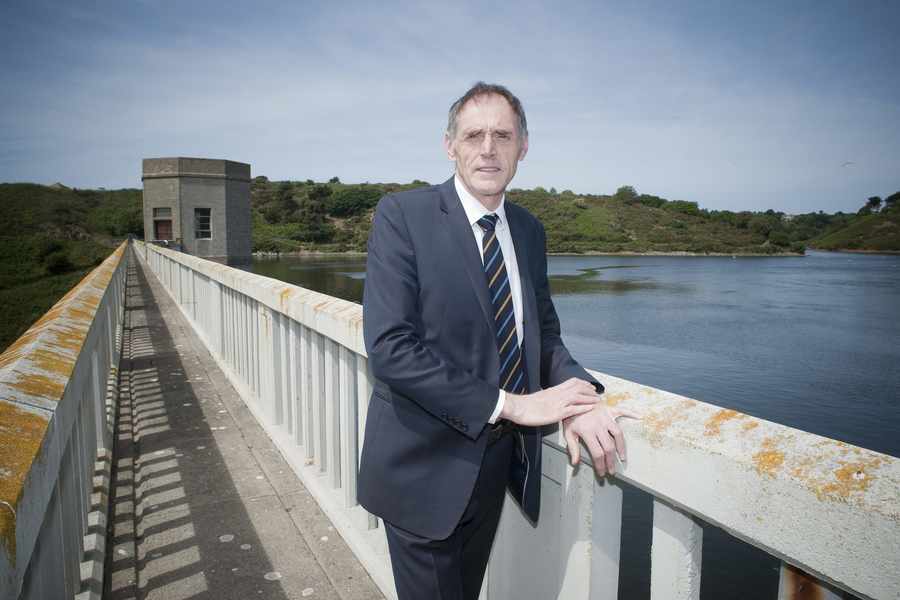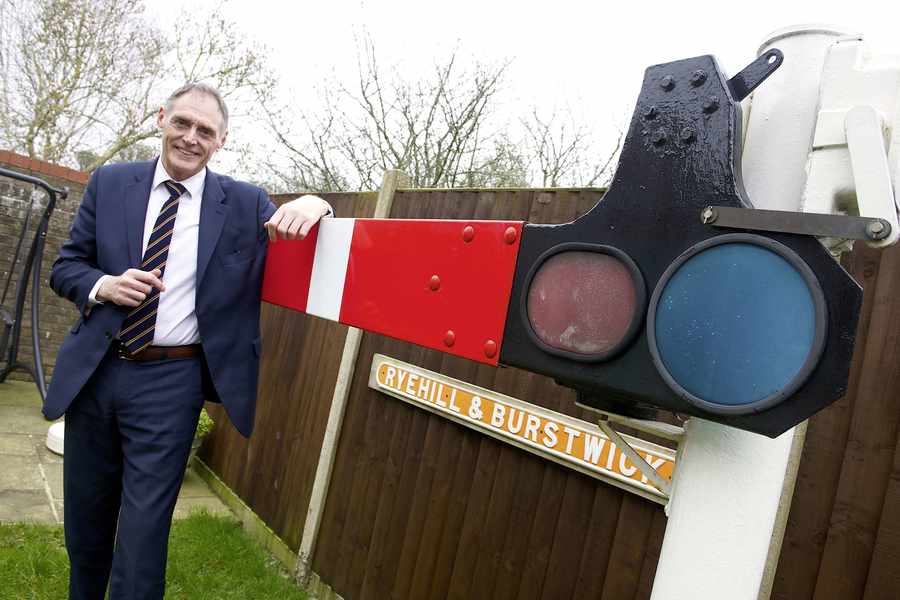- Interview with Howard Snowden, who is retiring as MD of Jersey Water.
- He is now looking forward to indulging his passion for steam engines.
THERE are not many people who can combine their life-long passions with their working lives.
Howard Snowden, who retires this month as managing director of Jersey Water, is one of the lucky ones.
For the past 23 years he has been ‘getting his hands dirty’ around the Island’s reservoirs, dams and pumping stations, making use of a passion for engineering that began when he was a lad growing up in the East Riding of Yorkshire.
His other labour of love is a ten-foot-long miniature steam locomotive that he is building in his workshop at home.
‘It’s a sit-on job, capable of carrying 20 to 30 people when it’s finished,’ he explains.
‘I was brought up around it – my father and my grandfather worked for the waterworks and we lived on a pumping station, one of the last to be steam-driven.
‘Nowadays health and safety wouldn’t allow it, but as a boy I was able to do things like stop and start the big engines.’
On Saturday afternoons, he recalls, he and his friends would cycle from home in Cottingham, between Hull and Beverley, to the steam locomotive station in Hull.
‘In those days you could just walk in, steam was on the go and we would go around and look at the engines. Nowadays, you wouldn’t get past the gate. It is a big issue, because people don’t get a sense of what they want to do, being involved, going to see things. That is what ignites interest.’
As an industrial centre, Hull was a place of opportunity for anyone with a leaning towards practical skills. ‘I went to a technical school – there were quite a lot of technical schools because there was a lot of industrial employment. I was fortunate in that I could have gone into any industry, but I ended up working for Yorkshire Water – not because of my father, but because I happened to like engineering.’
He completed his professional qualifications to post-graduate level on a day-release and part-time basis, while continuing to work.
‘It wasn’t the easiest way to do it, although it was more useful in terms of industry experience. This was a period when the old plant was coming to the end of its era, moving from steam to diesel electric, and I got involved in some big projects.’
It was just before the privatisation of the water industry under Margaret Thatcher’s government that Mr Snowden decided to make a move to a small family consultancy firm, advising Anglian Water. ‘I was then in my mid-30s, the industry was changing and I thought if I didn’t move then, I might never make the change.
‘I had a very happy five years there, and because it was a small family business, I could have a big impact. But then they decided to sell the business to a much bigger company and I knew the culture would change.’
It was while he was looking around for another opening that he saw a job advertisement for a senior engineer at Jersey Water.
‘It was several months before I heard, but they shortlisted me, so in November 1991 I came to Jersey for the interview and moved over with my wife, Lynn, and our two daughters the following March.
‘The interview was the first time I’d been to the Island, although my parents were regular holidaymakers here and I’d heard some good reports. My family were just the right age – Alexandra and Elizabeth were then five and six and they have done well and taken to Jersey life. We live in St Mary and one of the benefits of living in a smaller parish is that you can get involved.’
Working for Jersey Water, too, turned out to be another lucky career move. ‘It is a relatively small company – only 83 staff – and it has quite a family culture,’ he explained. ‘When I first came in 1991, I had that feeling straight away, and they obviously felt that I would fit in as well.
‘I know all the staff on first-name terms and we are all very hands-on. If there was ever a problem, I know I would be able to pick up the phone and all the staff would come out.’

As senior engineer, Mr Snowden was third in command, and when the then managing director retired four years later he knew he stood a chance of being promoted.
‘Hopefully, over the past 18 years we’ve really simplified the system in Jersey. There used to be lots of little booster stations, but in 2004, with the Les Platons scheme, we were able to do away with 12 of the boosters and now the system relies on gravity, with a trunk main across the top of the Island.
‘The service reservoir gives resilience, so now there is half a day’s supply at Les Platons so that people will always have access to water.’
Mr Snowden is also proud of the fact that during his 23 years at the company, almost every inch of it has been re-engineered and re-equipped, including the desalination plant, which is now due for another overhaul – a project that he will continue to oversee on a part-time basis, having worked on it for the past 18 months.
One thing’s for sure – retirement will not leave him short of things to do, not least finishing his steam locomotive.
‘In fact, I’ve got two, because another was left to me by a fellow worker at Jersey Water who didn’t want it to end on the scrapheap. And I’ve got 400 metres of the seven-and-a-quarter gauge track. But that’s for the future!
‘I’ve always been a railway enthusiast. I was offered a job on the railways, and I still travel by train a lot when I’m in the UK.’
He also keeps a collection of railway memorabilia in his garden, including unique items from stations long since closed, along with a collection of clocks, one of which tick-tocks in the background throughout this interview.
‘This is an American clock, from about 1900. When the Americans started to mass produce, they wiped out the English clock-making industry.’
The clocks Mr Snowden keeps at home are from various stations on the LNER line. ‘It shows how well they were made that they are still working. But it’s a mammoth job when the clocks go back and forward,’ he smiles, ‘ and a weekly chore every Sunday night to wind them up!’
In terms of travel, he is ‘not much of a globe trotter’, but he and Lynn, who comes from Hull, return to Yorkshire twice a year for their ‘fix’ of home and the rolling countryside of the East Riding.
He has kept up the habit of cycling, too, and enjoys swimming to keep fit.
As far as the future of Jersey Water is concerned, there is work still to do, but much progress has been made. Around 5,000 properties are still without mains, but 90 per cent of households are now connected. With the nitrate working group now coming up with some action plans, he hopes that in future the levels of nitrates in Jersey’s water will continue to decline.
One thing Mr Snowden cannot control is the climate, which is why the extension of the desalination plant is a necessary investment.
‘From what we understand, rainfall will change,’ he said. ‘We get extremes now, with very wet conditions for longer periods, but what is worrying us is the opposite, with long periods of drought, and our limited storage.’
He is leaving the company in the safe hands of Helier Smith, who is currently chief operating officer. And with multi-disciplined and talented staff, he says, there is no shortage of engineering expertise.
‘Some of the chaps have three or four different skills and people tend to stay a long time – it is not unusual for people to have 40 years of service. That speaks well for the company – that there is a sense of great pride in the job.’







